Skin rashes in babies
It's normal for babies to develop rashes from as early as a few days old. If your baby has a rash but doesn’t show signs of illness, speak to your midwife, health visitor, or your GP. If your baby appears unwell, call your GP or GP out of hours service.
About skin rashes in babies
It's important to be aware of the symptoms of meningitis.
Below is information on some of the most common rashes in babies. Most rashes are harmless and go away on their own.
This guide may give you a better idea of the cause of the rash. But don't use it to diagnose your baby's condition. Always speak to a health professional for a proper diagnosis.
For causes of rashes in older children, see:
Baby acne (neonatal acne)
Baby acne is where pimples sometimes develop on a baby's cheeks, nose and forehead within a month of their birth.
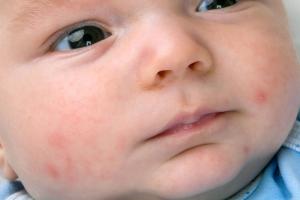
With baby acne:
- pimples tend to get worse before clearing up completely after a few weeks or months
- washing your baby's face with water and a mild moisturiser can improve the appearance of their skin
- avoid acne medicines intended for older children and adults
Pimples or blackheads that develop after three months of age (infantile acne) tend to be more severe. These often need medical treatment.
Cradle cap
Cradle cap is where yellowish, greasy, scaly patches develop on a baby's scalp.
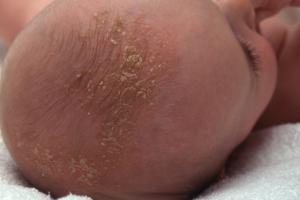
Cradle cap:
- occasionally, as well as the scalp, can also affect the face, ears and neck
- isn't itchy and shouldn't bother your baby- if your baby is scratching or upset, they may have eczema
- is a common condition that tends to develop within two or three months after birth
- usually gets better without treatment in a few weeks or months
Gently washing your baby's hair and scalp with baby shampoo may help to prevent further patches developing.
Eczema
Eczema is a long-term condition that causes the skin to become itchy, red, dry and cracked.
The most common form is atopic eczema. It mainly affects babies and children but can continue into adulthood.
Atopic eczema:
- in babies under six months is sometimes associated with allergies to milk and egg
- often starts in young babies as a red, itchy rash on the face, scalp and body
- as the child gets older, usually starts to develop in areas with folds of skin, such as behind the knees or on the front of the elbows
Creams and ointments can often relieve the symptoms.
Erythema toxicum
Half of all newborns develop a blotchy red skin reaction called erythema toxicum. This is usually at two or three days old.
It's a normal newborn rash that won't bother your baby and clears after a few days.
Hand, foot and mouth disease
Hand, foot and mouth disease is a common, viral illness.
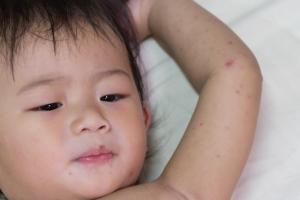
About hand, foot and mouth disease:
- it causes a blistery rash on the palms of the hands and soles of the feet, as well as ulcers in the mouth
- your baby may also feel unwell and have a fever
Treatment isn't usually needed, as the baby's immune system clears the virus. The symptoms go away after about seven to 10 days.
If you're worried, see your GP.
Hives (urticaria)
Hives is also known as urticaria.
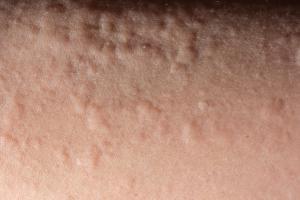
Hives
- cause a raised, red itchy rash that appears on the skin
- happen when a trigger (such as a food that your baby is allergic to) causes a substance called histamine to be released into their skin
If your baby gets urticaria during feeding, the condition may be triggered by something they've had to eat or drink.
The most common foods are egg and milk, but many other foods can sometimes be the cause.
The urticaria rash is usually short-lived and can be controlled with antihistamines.
If your baby often gets hives, talk to your GP about possible allergies.
Impetigo
Impetigo is a highly contagious bacterial infection of the surface layers of the skin. It causes sores and blisters.
It's not usually serious, but you can visit your GP for a prescription of antibiotics. This should clear the infection within seven to 10 days.
Milia
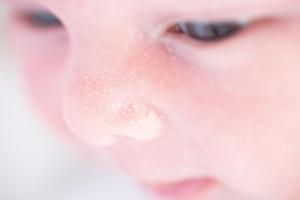
About half of all newborns develop tiny (1 to 2 mm) white spots on their face. These are called milia.
These are just blocked pores. They usually clear within the first four weeks of life.
Nappy rash
Nappy rash occurs when the skin around the baby's nappy area becomes irritated.
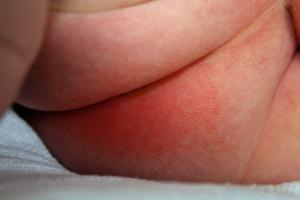
Nappy rash:
- is often caused by exposure to wee or poo for a long period of time
- can sometimes be the result of a fungal infection or rare skin condition
You can usually reduce nappy rash by taking simple steps to keep your baby's skin clean and dry. You can use a barrier cream if needed. Antifungal cream may be necessary if the rash is caused by a fungal infection.
Ringworm
Ringworm is a common fungal skin infection. It causes a ring-like red rash almost anywhere on the body (the baby's scalp, feet and groin are common areas).
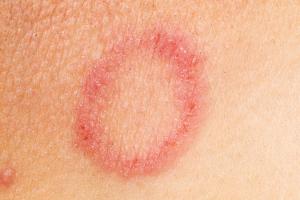
It's usually easily treated using over-the-counter creams.
Ask your pharmacist if you need advice about treatment.
Scabies
Scabies is a common infestation of the skin that can affect people of all ages.
Scabies:
- is caused by tiny mites that burrow into the skin
- is often spread between family members, so when babies get scabies it's usually because someone else in the family had it recently
- develops in babies as tiny and very itchy spots all over the body, including on the soles of the feet, armpits and genital area
Treatment with creams that kill the scabies mite needs to be given to the whole family at the same time for it to be effective.
Visit your GP if you think your baby has scabies. It's not usually a serious condition, but it does need to be treated.
Your GP will discuss treatment with you. The treatments most widely used are a cream and lotion.
Slapped cheek syndrome
Slapped cheek syndrome is a viral infection particularly common in children and babies.
About slapped cheek syndrome:
- it typically causes a bright red rash on both cheeks and a fever
- most babies won't need treatment, as slapped cheek syndrome is usually a mild condition that passes in a few days
Sweat rash (miliaria)
A heat rash is sometimes called miliaria or prickly heat. It may flare up when your baby sweats. For example, because they're dressed in too many clothes or the environment is hot and humid.
It's a sign your baby's sweat glands have become blocked.
They may develop tiny red bumps or blisters on their skin, but these will soon clear without treatment.
Meningitis
Meningitis is an infection of the protective membranes that surround the brain and spinal cord (meninges).
About meningitis:
- the classic rash associated with meningitis usually looks like small, red pinpricks at first
- it then quickly spreads over the body and turns into red or purple blotches
- it is a blotchy rash that doesn't fade when a glass is rolled over it (this won't always develop)
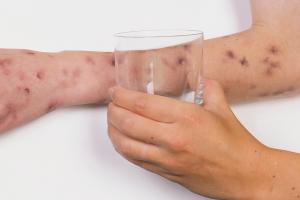
Meningitis warning signs
It's important to be aware of the warning signs of meningitis in your baby, which include:
- becoming floppy and unresponsive, or stiff with jerky movements
- becoming irritable and not wanting to be held
- unusual crying
- vomiting and refusing feeds
- pale and blotchy skin
- loss of appetite
- staring expression
- very sleepy with a reluctance to wake up
- fever
Some babies develop a swelling in the soft part of their head (fontanelle).
Trust your instincts.
If you think your baby has meningitis, see your GP or GP out of hours service immediately or go to your nearest emergency department.
More useful links
The information on this page has been adapted from original content from the NHS website.
For further information see terms and conditions.